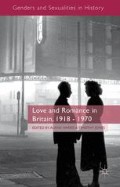Abstract
In the 1958 novel Love This Enemy, the ‘hero’ Steve is described as ‘a mixture of passionate he-man and paternal overlord’.1 With this characterization, author Kathryn Blair, a pseudonym for Lilian Warren, Mills & Boon’s biggest-selling author in the 1950s,2 described the epitome of popular romantic heroes. Yet Steve also demonstrates his capacity for affection by taking care of an abandoned child. In doing so, he forces Kay, the ‘heroine’, to see his softer side: ‘The instincts are rooted there — protect the women and children.’3 Indeed, he also shows emotion when Kay is ill; on realizing her state, he makes a ‘small savage sound’ and ‘[h]is jaw went so taut that it twitched’. He tends to her gently, and barely leaves her until she has recovered, even though their love is certainly not clear by this point.4 This represents a large proportion of fictive heroes at this time. The ‘perfect man’ of mid-twentieth-century Britain could be a contradictory figure, combining traditionally ‘manly’ attributes and authority with a caring side. This chapter will consider examples from both the press and romance literature to analyse how men’s position as (potential) fathers figured within a normative masculinity deemed attractive to women. The affective relationships in romance novels during this period in Britain incorporated a hierarchy between men and women; in this genre at least, there was limited evidence of the equal, companionate marriage ideal which was promoted in other media, and found to be the ‘most distinctive feature of domestic life’ at this time.5
Access this chapter
Tax calculation will be finalised at checkout
Purchases are for personal use only
Preview
Unable to display preview. Download preview PDF.
Select Bibliography
Bingham, A. (2009) Family Newspapers? Sex, Private Life, and the British Popular Press 1918–1978 (Oxford: Oxford University Press).
Bingham, A. (2004) Gender, Modernity, and the Popular Press in Interwar Britain (Oxford: Clarendon Press).
Brooke, S. (2001) ‘Gender and Working Class Identity in Britain during the 1950s’, Journal of Social History 34(4), 773–95.
Bruzzi, S. (2005) Bringing Up Daddy: Fatherhood and Masculinity in Post-War Hollywood (London: British Film Institute).
Finch, J. and P. Summerfield (1991) ‘Social Reconstruction and the Emergence of Companionate Marriage, 1945–59’, in D. Clark (ed.), Marriage, Domestic Life and Social Change (London: Routledge), pp. 7–32.
Francis, M. (2002) ‘The Domestication of the Male? Recent Research on Nineteenth-and Twentieth-Century British Masculinity’, The Historical Journal 45(3), 637–52.
Giles, J. (2009) Women, Identity and Private Life in Britain, 1900–50 (Basingstoke: Macmillan).
King, L. (2012) ‘Hidden Fathers: The Significance of Fatherhood in Mid-Twentieth-Century Britain’, Contemporary British History 26(1), 25–46.
McAleer, J. (1999) Passion’s Fortune: The Story of Mills & Boon (Oxford: Oxford University Press).
McAleer, J (1992) Popular Reading and Publishing in Britain, 1914–50 (Oxford: Clarendon Press).
Rose, S. O. (2004) ‘Temperate Heroes: Concepts of Masculinity in Second World War Britain’, in S. Dudink, K. Hagemann and J. Tosh (eds.), Masculinities in Politics and War: Gendering Modern History (Manchester: Manchester University Press), pp. 177–97.
Szreter, S. and K. Fisher (2010) Sex Before the Sexual Revolution: Intimate Life in England 1918–1963 (Cambridge: Cambridge University Press).
Editor information
Editors and Affiliations
Copyright information
© 2015 Laura King
About this chapter
Cite this chapter
King, L. (2015). The Perfect Man: Fatherhood, Masculinity and Romance in Popular Culture in Mid-Twentieth-Century Britain. In: Harris, A., Jones, T.W. (eds) Love and Romance in Britain, 1918–1970. Genders and Sexualities in History Series. Palgrave Macmillan, London. https://doi.org/10.1057/9781137328632_3
Download citation
DOI: https://doi.org/10.1057/9781137328632_3
Publisher Name: Palgrave Macmillan, London
Print ISBN: 978-1-349-46043-4
Online ISBN: 978-1-137-32863-2
eBook Packages: Palgrave History CollectionHistory (R0)

